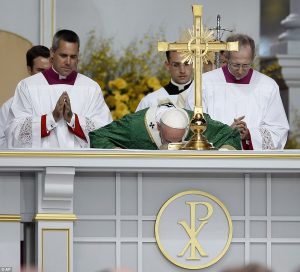 It is clear that from the earliest times a kiss was not only a token of love, but also under certain circumstances a symbol of profound respect. For example, the son of Sirach (Ecclus., xxix, 5) describes how would-be borrowers, when they wish to ingratiate themselves “kiss the hands of the lender, and in promises they humble their voice”. It is in accordance with this symbolism, so universally understood and practiced, that the Church enjoins the kissing of many holy objects, e.g. relics, the book of the Gospels, the cross, blessed palms, candles, the hands of the clergy and nearly all the utensils and vestments connected with the liturgy.
It is clear that from the earliest times a kiss was not only a token of love, but also under certain circumstances a symbol of profound respect. For example, the son of Sirach (Ecclus., xxix, 5) describes how would-be borrowers, when they wish to ingratiate themselves “kiss the hands of the lender, and in promises they humble their voice”. It is in accordance with this symbolism, so universally understood and practiced, that the Church enjoins the kissing of many holy objects, e.g. relics, the book of the Gospels, the cross, blessed palms, candles, the hands of the clergy and nearly all the utensils and vestments connected with the liturgy.
Every time a priest kisses or reverences the altar, he does so in order to honor the altar of sacrifice (which represents Christ) where the miracle of the Eucharist occurs. The kiss also signifies the union of the Spouse (Christ) and his Bride (the Church). Another reason, deeply rooted in ancient Christian tradition, is to reverence the relics of the saint or martyr placed within the altar itself.
During the first centuries of church history, Masses were often celebrated in the underground catacombs on stone slabs covering the tomb of a martyr. This was done in order to reverence the martyr and their heroic and ultimate sacrifice for the Lord. This also was done out of necessity: Being a Christian was illegal throughout the Roman Empire (thus the existence of martyrs) and the Mass had to be celebrated in secret.
When the emperor Constantine legalized Christianity early in the fourth century, the celebration of the Mass moved from underground to above ground, from the catacombs to public buildings or churches. When this transition occurred, the practice and tradition of venerating the martyrs was not left behind but continued to be an important dimension of the Mass.
When a priest kisses the altar, he is reverencing the person of Christ, which the altar represents, and is also, even if they are not present, continuing the ancient tradition of honoring the great and heroic sacrifice of the martyrs.
Northwest Catholic
